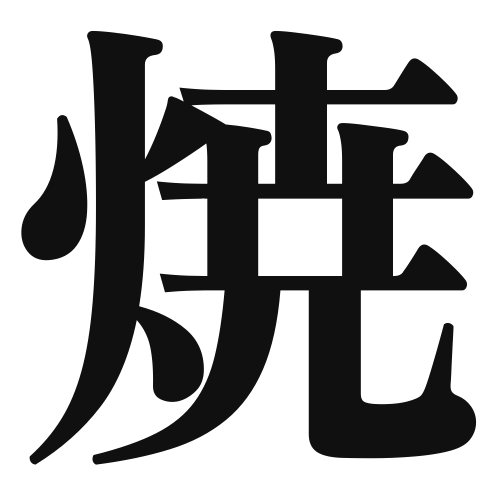1. Overview of Meaning
The kanji “焼” (yaki) means “to burn” or “to grill.” It is commonly associated with cooking methods that involve heat, such as grilling or roasting food.
2. Formation and Radical
Formation of the Kanji: The kanji “焼” is a phono-semantic compound (形声文字), which means it combines a meaning component and a phonetic component. The left part, “火” (hi), represents fire, indicating the action of burning, while the right part, “夭” (you), provides the phonetic sound.
Radical: The radical of “焼” is “火” (fire), which is commonly found in kanji related to heat and cooking.
3. Examples of Usage
Common Words and Phrases:
- 焼肉 (yakiniku) – grilled meat
- 焼き魚 (yakizakana) – grilled fish
- 焼きそば (yakisoba) – fried noodles
Example Sentences in Daily Conversation:
- 今晩、焼肉を食べに行きましょう! (Let’s go eat grilled meat tonight!)
- この魚は焼くととても美味しいです。 (This fish is very delicious when grilled.)
4. Synonyms and Antonyms
Similar Kanji:
- 煮 (ni) – to boil; while “焼” involves cooking with direct heat, “煮” refers to cooking in liquid.
- 炒 (itau) – to stir-fry; both involve cooking, but “炒” specifically refers to frying in a pan.
Antonyms:
- 冷 (rei) – cold; it represents the opposite of heat.
- 生 (nama) – raw; it refers to food that has not been cooked.
5. Cultural and Historical Background
Relation to Japanese Culture: The kanji “焼” is deeply rooted in Japanese culinary traditions, especially in dishes like yakitori (grilled chicken) and yakiniku. Grilling is a popular cooking method in Japan, often associated with social gatherings.
Proverbs and Idioms:
- 焼け石に水 (yakeishi ni mizu) – “water on a burning stone,” meaning a futile effort.
- 焼き畑 (yakihata) – “burned field,” referring to a method of agriculture where land is cleared by burning.
